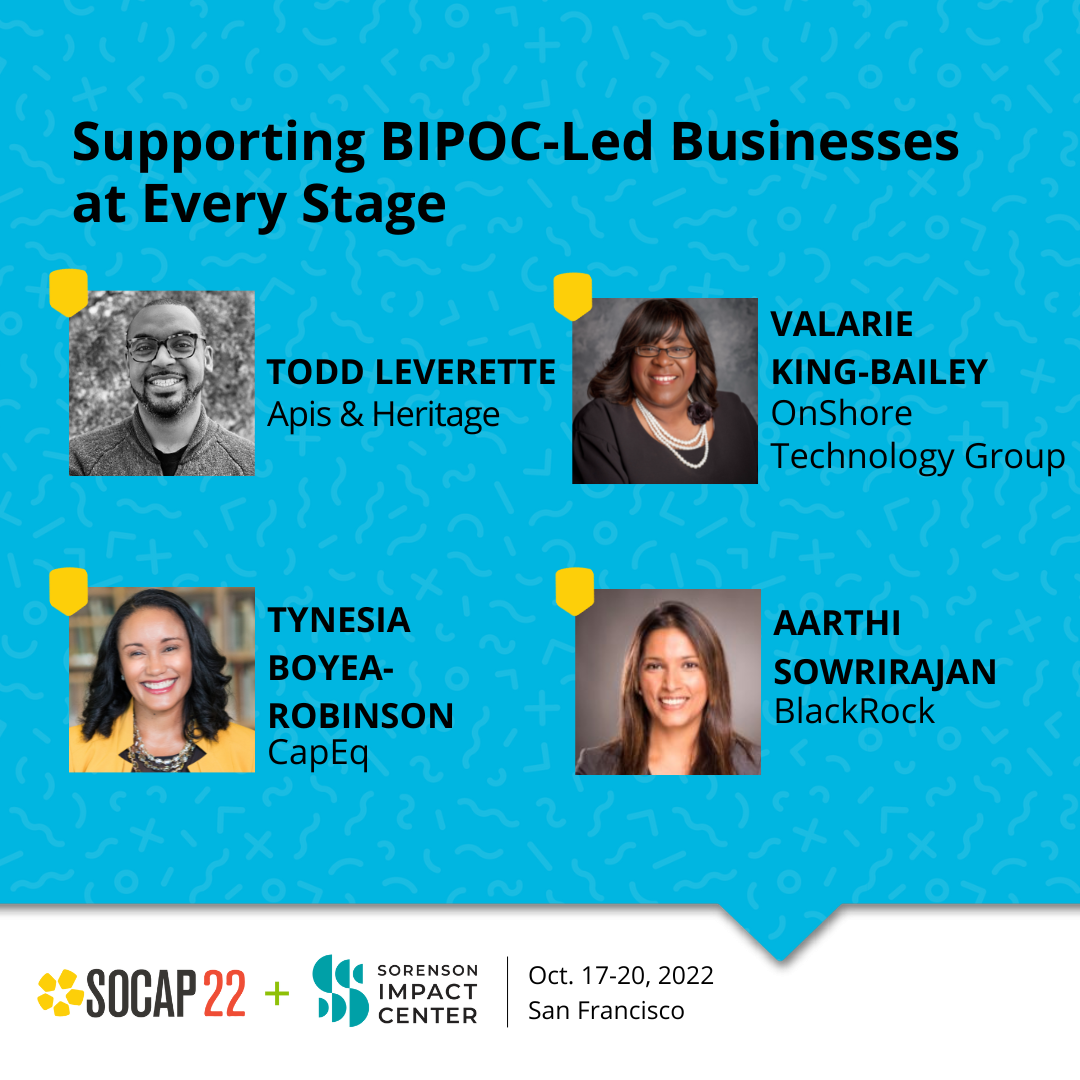Supporting BIPOC-Led Businesses at Every Stage with Financial Tools for Growth
With a focus on business owners who are people of color, more investors are using capital in unique ways to sustain and build a financial ecosystem that works for everyone. At SOCAP22, investors with lived experience in equity challenges discussed how they are partnering to build pathways to capital for business owners of color — with revenue-based financing, employee stock ownership plans, buyout capital, and other market tools.
Tynesia Boyea-Robinson, President and CEO, CapEQ, moderated the session on Supporting BIPOC-Led Businesses at Every Stage. She noted that the SOCAP community showed an early commitment to equitable impact investing and continues to make it an area of focus. Boyea-Robinson said the impact community realizes the need for behavior and systems change to achieve economic parity, which is the focus of the team at CapEQ.
“When you’re a business owner and you’re of color, frankly all of the chips are often stacked against you,” she said. “One of the system change efforts that we’re working on (at CapEQ) is a national effort to fuel Black business growth called Path to 15|55.” Recognizing the potential for collective impact, the Path to 15|55 project looks to realize the promise of research that found if just 15% of Black-owned businesses are able to hire one more employee, the U.S. economy could grow by $55 billion and 600,000 jobs. Boyea-Robinson said the SOCAP community can play a crucial role in tackling barriers for business owners of color that include lack of trust, lack of access to capital, and biases in policies and processes.
As a Black woman entrepreneur, Valarie King-Bailey has faced many of those barriers while launching what is now OnShore Technology Group in 2004. King-Bailey created a business plan and presented it to several banks and VC firms but found no takers. She used $2,500 of her own money to fund what is now a growing global business with 12 workers that provides software testing for life science companies. “To say that access to capital matters? It matters. I’m the poster child for that,” she said. “It was very difficult to access larger amounts of capital that would’ve helped to accelerate the business. A lot of capital providers just don’t take women-owned businesses seriously. It’s 2022; we have to change that paradigm.”
She eventually connected with Founders First Capital Partners, which provides a revenue-based funding structure for repayment. “If you have a month where you make no money, you pay no money,” she said. “Unlike venture capital, they don’t take an equity stake in the company. … Revenue-based financing gave me the opportunity to retain 100% ownership of OnShore while accessing the capital I needed for the business.”
At Apis & Heritage Capital Partners, Co-Founder and Partner Todd Leverette is part of the team that provides funding to transfer ownership of small businesses from founders to employees — a market tool that can help to bridge the racial wealth gap and create more pathways to capital. “We come in with our capital and we help those business owners sell their businesses to their employees,” Leverette said. “The goal is to address the racial wealth gap in a really scalable way.”
In partnership with the Democracy at Work Institute, Apis & Heritage shares best practices, training, and other tools to build the business case for employee ownership and help workers see the connection between their job and the finances of the company. “Employee ownership is cooperative economics as a legal structure,” he said. “People have an opportunity to share the risk and share the reward of the work they are doing. … The idea of being able to build long-term wealth … is the opportunity we’re trying to create.”
While investing through a racial equity lens, the BlackRock Impact Opportunities (BIO) Fund focuses on founders and companies in education, health care, workforce housing, financial inclusion, and inclusive or just transition. Senior Portfolio Manager Aarthi Sowrirajan said the BIO Fund invested and allocated about $175 million in its first year. “We can provide flexibility in investment vehicles and meet founders and companies where they are,” she said. “We are squarely in the area to help businesses in their growth stage.”
By leveraging the platform and skill sets at BlackRock, she said, BIO Fund is considering how best to amplify its investments and build a more equitable capital ecosystem. “Our hope is that the sector continues to grow, and is just at the tipping point of what’s possible,” she said. “We look at their supply chain, their vendors, and encourage them to think of ways they can diversify that supplier base … ways our investment dollar can go further and multiply through the ecosystem.”
Watch Supporting BIPOC-Led Businesses at Every Stage
Speakers:
Valarie King-Bailey, Chief Executive Officer, OnShore Technology Group
Todd Leverette, Co-Founder and Partner, Apis & Heritage Capital Partners
Aarthi Sowrirajan, Senior Portfolio Manager, BlackRock Impact Opportunities (BIO) Fund
Tynesia Boyea-Robinson, President and CEO, CapEQ, Moderator





